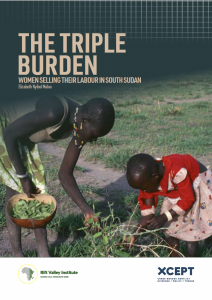SUMMARY
In rural South Sudan, markets for food, labour, and land are expanding, leading to increased workloads for women. Historically, rural women had two primary labour burdens: producing food for home consumption and providing essential life-giving labour such as child-rearing and household maintenance. These were unpaid. Now, they face a third burden: producing food for sale and selling their labour for pay to afford essential services like health and education.
This study explores the labour burdens of women in agriculture, based on interviews conducted in Western Bahr al-Ghazal and other areas of Sudan. As food, labour, and land become commodities, women’s working lives are transforming. The process of ‘commodification’ shifts rural life towards producing surplus food for profit rather than household subsistence. This change has led to the devaluation of unpaid work, adding to the cultural and social shifts in South Sudanese communities.
This report is a product of the FCDO’s Cross-Border Conflict Evidence, Policy and Trends
(XCEPT) programme, funded by UK aid from the UK government. XCEPT brings together leading experts to examine conflict-affected borderlands, how conflicts connect across borders, and the factors that shape violent and peaceful behaviour. The programme carries out research to better understand the causes and impacts of conflict in border areas and their international dimensions. It supports more effective policymaking and development programming and builds the skills of local partners. The views expressed do not necessarily reflect the UK government’s official policies.




